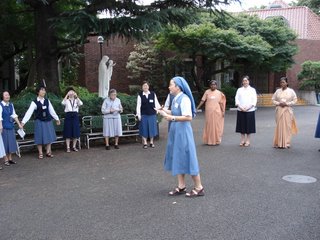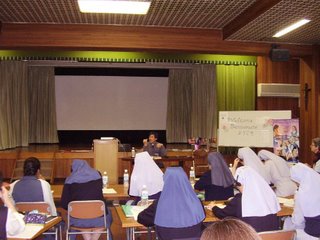We share - Condividiamo
Tokyo: è la città più popolata al mondo: 29.870.000 abitanti

“Where and how and toward what is humanity moving? Will it be saved?”
(Blessed James Alberione)
“Dove cammina, come cammina, verso quale meta cammina questa umanità…sarà salva?...”
(Beato Giacomo Alberione)
***
 Tokyo: Entrance of the Chapel and the Conference Room
Tokyo: Entrance of the Chapel and the Conference Room
Tokyo: Ingresso della Cappella e della Sala per l’incontro
***
 Sr Ninfa introduces us to the program of the day
Sr Ninfa introduces us to the program of the day
Sr Ninfa ci introduce nel cammino del giorno
 ***
***
 Sr Wendy presents the group dynamics
Sr Wendy presents the group dynamics
Sr Wendy presenta la dinamica di gruppo
***
 Sr Teresia Imura presents P. T. Sawada, ssp
Sr Teresia Imura presents P. T. Sawada, ssp
Sr Teresia Imura presenta P. T. Sawada, ssp
***
 Fr. T. Sawada gave a talk on “Vocation: anthropological and biblical foundation.”
Fr. T. Sawada gave a talk on “Vocation: anthropological and biblical foundation.”
“There are many vocation stories in the Bible. Some of these substantially present the theological aspect like for example in the vocation story of the first four disciples in the synoptic Gospels. Others put more stress in describing the human drama of the person being called as in the case of Moses and Jeremiah.
The reason for which I chose Paul is not simply because he is the model and protector of the Pauline Family. Rather, it is because Paul is perhaps the only biblical person whose life’s episode has not only been described in the Bible but that he himself wrote the letters with his own hand and these are contained in the Bible. There are some other letters attributed to the apostles or to important disciples as for example the two letters of St. Peter, one letter of James and the Johanine letters. But it is understood that in reality, these were not hand written by them. On Paul’s vocation, we are able to know, as some first Christians have known it, and how Paul himself understood it. And another interesting fact: the use of the word “to call/called” alluding to the meaning of “vocation” is almost exclusively Pauline in the New Testament.
... Paul is very keen in perceiving the relationship between God and men in the concept of vocation.
The call is never an exclusive relationship between God and me but makes me open and always enables me towards relating with other persons.”
*
P. T. Sawada ha affrontato il tema: La vocazione: fondamento antropologico e biblico
“Ci sono tanti racconti vocazionali nella Bibbia. Alcuni di essi presentano sostanzialmente l’aspetto teologico: ad esempio il racconto della vocazione dei primi quattro discepoli nei vangeli sinottici. Altri descrivono più il dramma umano della persona chiamata: quelli di Mosé o di Geremia…
Il motivo, per cui ho scelto Paolo, non è semplicemente perché lui è il modello e protettore della Famiglia paolina. Ma perché Paolo è forse l’unica persona biblica, nel senso che non solo viene descritto nella Bibbia l’episodio della sua vita, ma anche lui stesso ha scritto le lettere di mano ed essi sono contenuti nella Bibbia. Ci sono degli altri scritti attribuiti agli apostoli o ai discepoli importanti, quali due lettere di Pietro, una lettera di Giacomo e gli scritti giovannei, ma si sa che queste opere, in realtà, non sono di loro mano. Sulla vocazione di Paolo, possiamo sapere come alcuni primi cristiani l’hanno vista e allo stesso tempo come l’ha compresa lui stesso. Ed un altro fatto interessante: l’uso del termine «chiamare/chiamata» nel senso della «vocazione» è nel NT quasi esclusivamente paolino.
... Paolo è molto acuto nel percepire la relazione tra Dio e gli uomini nel concetto della vocazione.
La chiamata non si chiude mai alla relazione tra Dio e me, ma mi apre e mi fa tendere sempre alla relazione con le altre persone".

